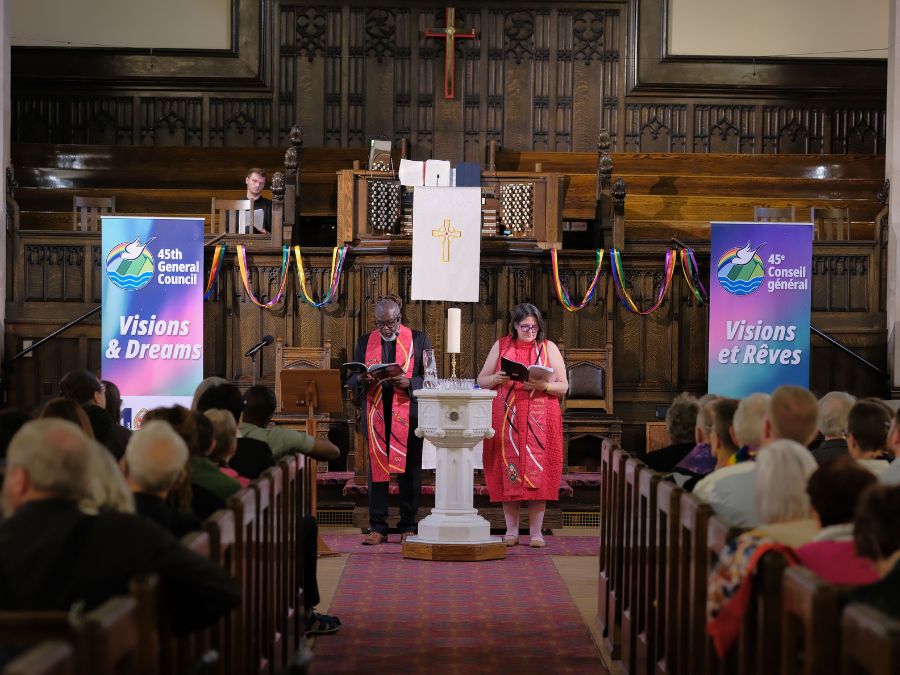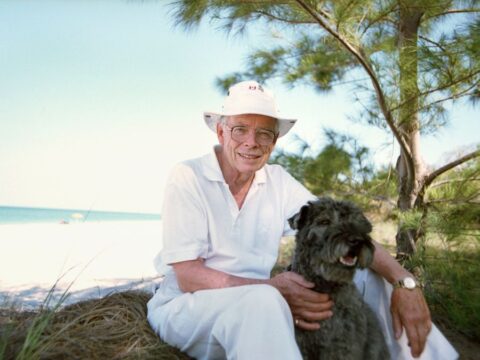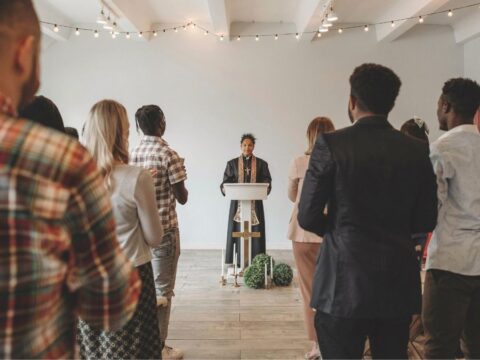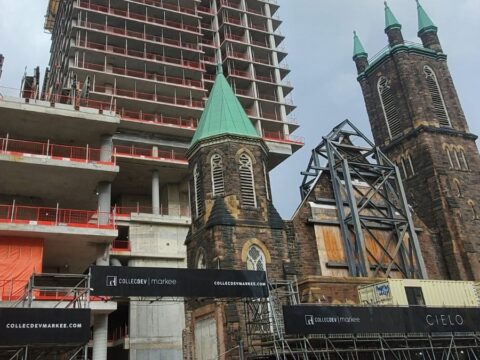On Aug. 8, The United Church of Canada apologized to the 2S and LGBTQIA+ people of the church. On that day, the apology, decades in the making, was presented as part of a worship service.
There was a lot of anxiety around the apology, stemming mainly from the fact that no one had seen a final copy of the words that would be spoken. The only text that had been shared was a draft presented at a town hall almost six months ago. Many expressed problems with that draft at the time, saying the words seemed empty, as if the church had been pushed into this rather than doing it of their own volition.
You may unsubscribe from any of our newsletters at any time.
I was sitting in a pew at Calgary’s Knox United on the day of the apology, surrounded by colleagues and friends. My thoughts turned to the elders who laid the groundwork for the path to the apology and pushed the United Church to accept the queer community. Some of those elders were present, others were watching online, and others sadly were watching in spirit. In 1988, the church referred only to “lesbians and gays,” but queer identity has grown in nearly 40 years to be 2S and LGBTQIA+ people.
After the apology, we gathered to share our initial responses to what was said. I heard hope from the youth, sadness that elders who fought for this day were no longer here, anger over the length of time it has taken to get here and fear that nothing will change.
Since that day, I have had many more conversations that are both positive and negative. We offered a space where those who could not speak their feelings could write them on paper hearts. I have collected those hearts, and they are now in a rainbow-painted box. These hearts and all of these conversations have helped me deepen my own response to the apology.
In some ways, I wish the apology had not been presented at this General Council. More time was needed to discern the path forward after the apology. I wish there had been more chances for consultation. We had one town hall; we needed at least one more before the apology. I wish the words of the apology had been given to the 2S and LGBTQIA+ participants who met for two days prior to the opening of General Council 45 for their input, as doing so may have alleviated anxiety.
More on Broadview:
- Her church cast her out for being gay. 30 years later, it made amends
- Watch the moment a bishop begs Trump to ‘have mercy’ on 2SLGBTQ+ people, migrants
- United Church forecasts losing 65% of members in the next decade
In one conversation, I was asked, “Why was the apology given by two queer people? Shouldn’t it have been given by someone who was from the Community of Concern or at least someone straight? It gave the impression that we were apologizing to ourselves rather than the church as a whole apologizing to the queer community in the church.” I know that Rev. Michael Blair and Very Rev. Carmen Lansdowne were apologizing as the general secretary and then-moderator, rather than as queer members of the church, but this person has a point. Former members of the Community of Concern — a group that opposed the ordination of gays and lesbians in the church — were sitting in the pews during the apology service. It would have been more impactful if one of them had offered the apology or shared the delivery with Blair and Lansdowne.
The apology, a carefully crafted document, is much more intellectual than heartfelt. I worry that it will not move the church forward and will merely be a gesture of words rather than actions. I would like to see a stronger commitment toward becoming an Affirming denomination. I live in guarded hope that the apology will gain meaning and purpose within the church and move it along the Affirming path.
***
Rev. Ruth Noble is the executive director of Affirm United/S’affirmer Ensemble.














Imagine if Christ said to us “Your apologies did not sound heart felt, therefore I will not forgive you sins.” Why is it that “something” is never good enough? Forgive, forget and move on.
Ya, so this apology wasn’t meant to secure the forgiveness that is ours through grace. It was meant to express both remorse and repentance for specific and deliberate harm that WE did to US. That SOME did to OTHERS.
As such, for it to be fulsome, detailed, honestly self-aware, and clearly heartfelt seems a minimum measure, in service of healing of people and relationships. We might endeavour to be Christ-like, but we are not Christ.
Grace came at a cost. We only receive grace when we express both remorse and repentance for specific and deliberate harm that we did to Christ. Do you live up to the standard that you express when dealing with your sins against God?
“Bear with each other and forgive one another if any of you has a grievance against someone. Forgive as the Lord forgave you.” Colossians 3:13
“Then Peter came to Jesus and asked, ‘Lord, how many times shall I forgive my brother or sister who sins against me? Up to seven times?’ Jesus answered, ‘I tell you, not seven times, but seventy-seven times!’” – Matthew 18:21-22 (Notice there is no mention that someone needs to ask for forgiveness)
You cannot endeavour to be Christ-like, it is only through Christ that this is possible. “And we all, with unveiled face, beholding the glory of the Lord, are being changed into his likeness, from one degree of glory to another; for this comes from the Lord who is the Spirit.” 2 Corinthians 3:18
You do not need to be Christ to forgive, it should be in your Christian nature. If it isn’t, I would pray that it does become part of my Christian nature.
Gary, saying “forgive, forget, and move on” trivializes the very real and ongoing harm that 2SLGBTQIA+ people still face in the church. This isn’t just about past wounds—discrimination continues today. There are still congregations where ministers will not marry same-gender couples. That reality makes any apology feel premature.
Forgiveness cannot be demanded, and forgetting is impossible when exclusion is alive and well at the local level. True healing will only begin when every congregation is safe and affirming, and when equal marriage is not treated as optional. Until then, this apology risks being more about easing the conscience of the institution than delivering justice to those harmed. This apology is a start but a long way from “movin’ on.”
From a gay and not a “queer” person my 2c. This article is not about a Christian response to an apology, in fact the words “God”, “Christ” and “forgiveness” are totally missing from it. There is nothing Christian about it: in words or content. Which would explain why it is about “feelings”. Sad piece, really.
I would suggest that the kind of response provided by the writer is about feelings precisely because the feelings are still raw for many. I know dozens of people who have been so traumatized by the church that they refuse to enter one. Many more are simply not in a position to offer forgiveness: they are not ready to do so, in part because the trauma is being relived in the present time, including by some actions like this apology, which – though a beginning effort, falls far short of even acknowledging (as others have noted) who it is who is asking for forgiveness or admitting wrongdoing. Would you demand that a survivor of intimate-partner violence forgive their abuser? Where would Christ be in such a demand?
Thank you
I am old, even by Church membership standards. I spent much of my professional career occupying positions from which my prejudices could, and most likely did, cause a lot of harm. I hope I have come a long way in the twenty-five years since I retired. I pray I am no longer a part of the problem for any person who is any way “other” in their sexual orientation. I think the point is well-taken that the apology would have been more befitting had it been delivered by one or more who had been part if the “Community of Concern.” That notwithstanding, let us be mindful that the conversation continues. We, the straight, must accept that we are on a learning curve. We must learn from our LGBTQ2S++ sisters and brothers in Christ. To say to others that they must forgive and be forgotten is to refuse to accept responsibilty for the part we could(!) play were we willing. I had once to instruct one of my subordinates that it was his prerogative to tell me if I sounded like a racist, not mine to deny that I might seem so. I, and other mainstream elders like me, have a duty to humble ourselves and say, “Please teach me.” It is time we listened. The formal Apology is only a beginning, not an attempt to get off the hook
Somewhere I am sure I have heard the familiar statement “Actions speak louder than words.” Many years ago I was part of the team who created the document titled “Gift, Dilemma and Promise…the Untied Chruch statement on human sexuality. At that time we met with persons who were closeted in and outside the church. I personally had done funerals for colleagues and other homosexual persons. Having to hide their truth cost them dearly. At that time this was a life and death struggle.
I am not for a minute defending the church, nor am I going to go into theological debate. To me apologies by word and document do little to change prejudice and ignorance. What changes humanity are the actions of our institutional structures and each one of us. Frankly homosexual persons are not served by being seen as victims. They are courageous persons who have braved a new pathway and understanding of faith for this church. The actions of the church have and still can offer truth beyond words. The truth of reconciliation, trust and unity. Let us go on with the actions of understanding, awareness, insight and the creation of communities of justice.